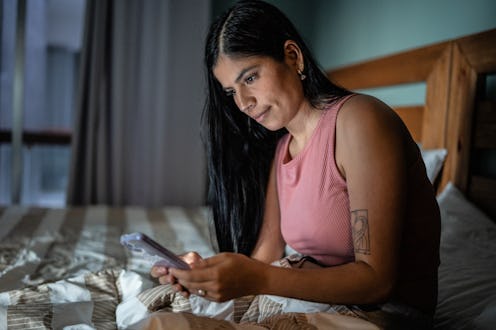Wellness
TikTok’s “Paradoxical Intention” Sleep Hack Is Actually Pretty Genius
It tricks your brain into feeling sleepy.

While I have quite a few sleep hacks in my back pocket, like white noise machines and lavender-scented pillow sprays, I still find myself lying awake regularly. I blame caffeine and stress, as well as the panic that starts to set in once I realize morning is fast approaching.
If you also struggle to fall or stay asleep, then you know what it feels like when your thoughts start to race as midnight ticks by and you still haven’t snoozed. Suddenly, all you can think about is how tired you’ll be in the morning, and how the lack of sleep is about to ruin your entire day.
The worry feels appropriate in the moment, but it really might be what’s keeping you awake, at least according to a sleep hack called paradoxical intention that’s been making the rounds on TikTok. It suggests that it’s counterproductive to try and force yourself to fall asleep, as that can ramp up your stress even more.
When this sleep hack came across my FYP, it felt like an aha moment. Paradoxical intention is all about embracing the fact that you’re awake as a way to trick your brain into falling asleep, and that seems pretty genius to me. Below, everything to know about this sleepy trick, as well as what it was like to give it a try.
Stay Awake To Fall Asleep
According to Dr. Shelby Harris, the director of sleep health at Sleepopolis, the paradoxical intention may be a trend on TikTok, but it’s also one of the many therapeutic approaches that are used when treating sleep disorders.
The idea is to embrace the fact that you’re awake, instead of overthinking, panicking, or stressing. It works sort of like opposite day: if you try to stay awake, that’s when your brain will want to go to sleep.
“The goal of this technique is to reduce performance anxiety and stress that comes from forcing yourself to fall asleep,” Harris tells Bustle. “By disrupting your anxious thoughts, paradoxical intention may help some relax and fall asleep easier, especially for people who overthink or whose sleep issues are rooted in psychological factors like stress or anxiety.”
Once you tell yourself that it’s OK to be awake at 1 a.m., you may feel your body and mind relax, and before you know it it’ll be morning.
This trick is definitely worth a try, and it can work wonders. However, according to Harris, it might not be as effective if you have chronic sleep problems.
Tricking Your Brain
Here, Dr. Harris explains how to try this viral sleep technique.
- Set up your bedroom for good sleep: lights off, cool temps, white noise, etc.
- Get into bed and relax.
- Try to shift your thoughts away from forcing yourself to fall asleep.
- Embrace the idea that it’s OK to still be awake.
- Avoid obsessively checking your phone or clock.
- Be patient.
- Experiment with the technique over multiple nights to see what works best for you.
Testing The Hack
One night last week I could not fall asleep, even though I felt pretty tired. I chalked it up to a late afternoon coffee, which was totally my bad, and maybe a touch of stress, too.
Typically, when I can’t fall asleep, I’ll feel that wave of worry overtake my body as I count the hours until morning. I’ll do the math in my head as I toss and turn, and sure enough, it ramps my stress up even more.
This time, though, I remembered the paradoxical intention hack and decided to just... let it be.
Instead of panicking, I accepted that I would be awake for the rest of the night. Instead of closing my eyes, I kept them wide open on purpose and almost taunted my brain with the notion that I would never sleep again.
Compared to other sleep hacks that require meditation, music, or gadgets, this one was super easy, completely free, and it also worked. All I had to do was attempt to stay awake, and just like that, I fell asleep, so it’s a good one to keep in my back pocket for days when I’m traveling or looking for a quick solution.
Once I decided to be awake, it felt like my body was suddenly more inclined to rest. It’s like my brain said, “You know what? I was just joking around. I’m actually pretty tired.”
Studies referenced:
Iskander, A. (2023). Normal multiple sleep latency test values in adults: A systematic review and meta-analysis. Sleep Med. doi: 10.1016/j.sleep.2023.06.019.
Jansson-Fröjmark, M. (2022). Paradoxical intention for insomnia: A systematic review and meta-analysis. J Sleep Res. doi: 10.1111/jsr.13464.
Sharma, MP. (2012). Behavioral interventions for insomnia: Theory and practice. Indian J Psychiatry. doi: 10.4103/0019-5545.104825.
Source:
Dr. Shelby Harris, director of sleep health at Sleepopolis